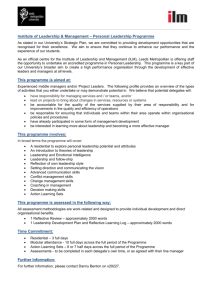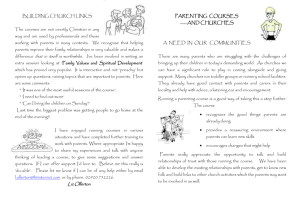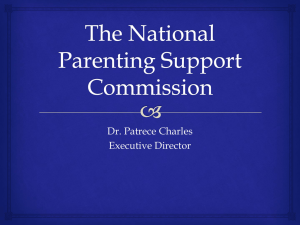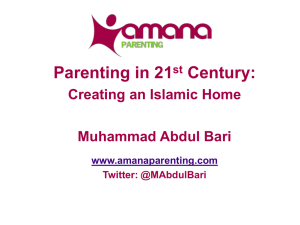5a. Reclaiming social work in Hackney
advertisement
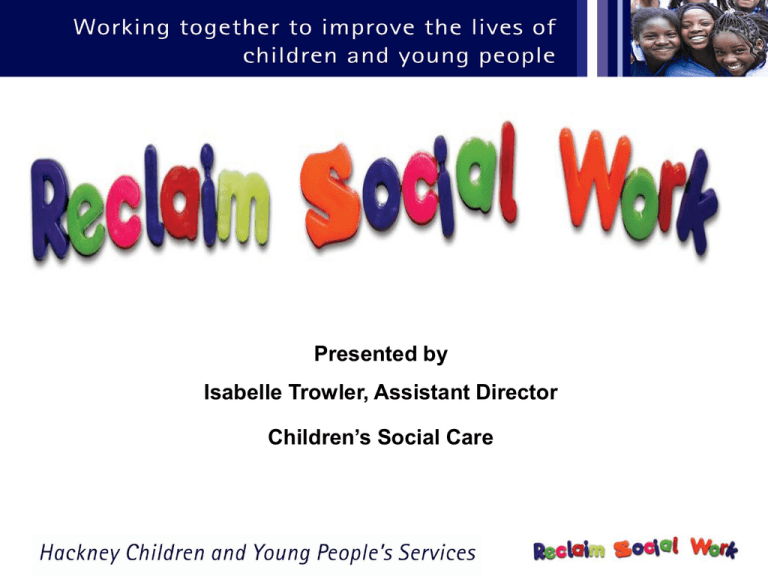
Presented by Isabelle Trowler, Assistant Director Children’s Social Care A casual culture – The problem with social work • A lack of confidence, expertise and gravitas • Calibre of social work graduates and training curriculum • Bureaucracy – the unintended consequences • The need for professional behaviours and creative and independent thinking • Reclaiming Social Work – Different ways of thinking and doing • Moving the money around • The Social Work Unit The Social Work Unit CONSULTANT SOCIAL WORKER SOCIAL WORKER CHILDREN’S PRACTITIONER FAMILY THERAPIST / CLINICAL PRACTITIONER UNIT CO-ORDINATOR How It Works • Weekly case review • Supervision arrangements • Devolved decision making (matrix of responsibility) • Direct work Direct Work - Systemic Approach • LAC Therapy and Duty Services • Children are part of a wider system comprising many relationships, we will engage with the system of concern • There are multiple points of influence within a system • Foster carers, health and school professionals are part of the child’s system as much as friends, parents and siblings • There are multiple perspectives to problems, this complexity is a strength • A conceptual framework – thought, language, behaviour • Think about everything all the time Direct Work – Social Learning Theory Evidence Based Intervention – Incredible Years (Early Intervention Parenting Programme (3-13)) – Mellow Babies (EIPP) – Fostering Changes/Strengthening Families (3-13;12-16) – Parenting Positively and other individually tailored parenting interventions supported through group supervision and case consultation (Lead Psychologist) – Psychology-led parent and child assessments – Going to scale Structure The Social Work Unit Strategy Whole scale change, no quick fixes, prescriptive methodology, savings invested, visible and consistent leadership Systems Shared Values Keeping families together safely Minimum state intervention Respectful and decisive practice Emotional and organisational warmth A political perspective on disadvantage Shared responsibility and confidence Simple and flexible, family focused, telling the story Skills IFT, Tavistock, De Montfort, Kent, Middlesex, LSE Motivating and intellectually stimulating – a critical mass Style Staff Finding a complimentary skill set, recruitment and ownership, our most valuable resource Privileging the voices of children and families, strengths and solutions, expert in child protection; danger of compromise Organisational Culture • Reflective learning and skill development - Openness and support (anyone can make a mistake) - Most importantly the re-establishment of the primary focus on social work on the family • Critical reflection is well understood and specifically applied • Systematic recovery from error and protection for the organisation of its most serious consequences Social Work Processes • • • • • • • Better decision making Reflective practice encouraged and enabled Skill mix brings new perspectives Improved interaction with families and professionals Better consistency and continuity of care Reduction of constraints on practice Burden of administration on practice significantly reduced Outcomes • Positive benefits for other professionals and families - better communications - strong reliable delivery of information • Value for money - 5% reduction in overall cost - Reduction(470 to 270) of looked after children - Very low numbers of children in residential care - Over 50% reduction in sickness levels - Reduction of agency staff (50% to 7%) • Strong performance indicators How We Did It • • • • • • Relentless in our pursuit Major attention to detail Constant feedback (open communications) Holding the line Sorted The art of compromise vs the danger of compromise Risk management - safe uncertainty What To Do Next • Knowing • Where excellence is found, systemise it and share it • Learn from mistakes • Disturbance and surprise • Total football
